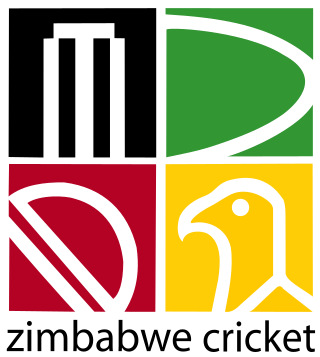One Day Internationals (ODIs)
Only match
5 February 1992 Scorecard |
v | ||
- South Africa won the toss and decided to field
- The match was played the day before both sides flew to Australia for the 1992 Cricket World Cup.
The South African national cricket team visited Zimbabwe in February 1992 and played a Limited Overs Internationals (LOI) against the Zimbabwean national cricket team. South Africa won the match by six wickets. South Africa were captained by Kepler Wessels and Zimbabwe by David Houghton. It was the first-ever international match between the two countries in Zimbabwe. [1] [2]
5 February 1992 Scorecard |
v | ||

The Cricket World Cup is the international championship of One Day International (ODI) cricket. The event is organised by the sport's governing body, the International Cricket Council (ICC), every four years, with preliminary qualification rounds leading up to a finals tournament. The tournament is one of the world's most viewed sporting events and considered as the "flagship event of the international cricket calendar" by the ICC. It is widely considered the pinnacle championship of the sport of cricket.

Test cricket is a form of first-class cricket played at the international level between teams representing full member countries of the International Cricket Council (ICC). A match consists of four innings in which players have to play until they get all batsmen out; the match ends when all batsmen of the opposing team are out. It is scheduled to last for up to five days with 6 hours of play each day. A minimum of 90 overs are scheduled to be bowled per day making it the sport with the longest playing time. In the past, some Test matches had no time limit and were called Timeless Tests. The term "test match" was originally coined in 1861–62 but in a different context.

The 1992 Cricket World Cup was the fifth Cricket World Cup, the premier One Day International cricket tournament for men's national teams, organised by the International Cricket Council (ICC). It was held in Australia and New Zealand from 22 February to 25 March 1992, and finished with Pakistan beating England by 22 runs in the final to become the World Cup champions for the first time. The tournament is remembered for the controversial "rain rule".

The Zimbabwe men's national cricket team, also known as the Chevrons, represents Zimbabwe in men's international cricket and is overseen by Zimbabwe Cricket. Zimbabwe has been a Full Member of the International Cricket Council (ICC) since 1992. As of May, 2023, Zimbabwe was ranked 10th in Tests, 11th in One Day Internationals (ODIs) and 11th in Twenty20 internationals (T20Is) by the ICC.

The Bangladesh men's national cricket team, popularly known as The Tigers, is administered by the Bangladesh Cricket Board (BCB). It is a Full Member of the International Cricket Council (ICC) with Test, One-Day International (ODI) and Twenty20 International (T20I) status. It played its first Test match in November 2000 against India with a 9 wicket win in Dhaka, becoming the tenth Test-playing nation. It became an associate member of the ICC in 1977, and competed in six ICC Trophies but performed inconsistently until 1997, which marked the year of their first major victory, winning the 1997 ICC Trophy held in Malaysia. This set Bangladesh on its way of becoming a Test-playing nation, a journey which ended with success in the year 2000.

The Kenya men's national cricket team represents the Republic of Kenya in international cricket. Kenya is an associate member of the International Cricket Council (ICC) which has Twenty20 International (T20I) status after the ICC granted T20I status to all its members.

The Uganda national cricket team, nicknamed the Cricket Cranes, is the men's team that represents Uganda in international cricket. The team is organised by the Uganda Cricket Association, which has been an associate member of the International Cricket Council (ICC) since 1998.

The Netherlands men's national cricket team, usually referred as "The Flying Dutchmen " is a team that represents the Netherlands in men's international cricket and is administered by the Royal Dutch Cricket Association.
The Bangladesh A cricket team, also known as Bangladesh Emerging cricket team, is a cricket team representing Bangladesh, and is the second tier of international Bangladeshi cricket below the full Bangladesh national cricket team. The team played its first game, against the full Pakistan side, in Savar in January 2002.

Harare Sports Club is a sports club and the Harare Sports Club Ground is a cricket stadium in Harare, Zimbabwe. Founded in 1900 and known as Salisbury Sports Club until 1982, it is mostly used for cricket matches, and has served as the primary cricket venue in Rhodesia and Zimbabwe since its foundation. Other sports played at the club are rugby, tennis, golf and squash.
The history of cricket in Zimbabwe, formerly Rhodesia and before 1965 Southern Rhodesia, includes Rhodesia first forming a first-class cricket team in August 1890, and the inaugural Test appearance of Zimbabwe in October 1992.
South Africa resumed official international cricket in 1991 after the moratorium imposed by the International Cricket Conference in 1970 was lifted. This was the first edition of the sir Vivian Richards trophy. This had restricted official contact with South Africa as a response to the policy of apartheid and South Africa's refusal to select non-white players for their international sporting teams. It formed part of the wider sporting boycott of South Africa during the apartheid era. The South African national team made a short tour of India in 1991. It then played in the 1992 Cricket World Cup in Australia and New Zealand. The decade saw a number of tours of South Africa by major international teams as well as the continued playing of domestic competitions.

The Zimbabwe A cricket team is a national cricket team representing Zimbabwe. It is the second-tier of international Zimbabwean cricket, below the full Zimbabwe national cricket team. Matches played by Zimbabwe A are not considered to be Test matches or One Day Internationals, instead receiving first-class and List A classification respectively. Zimbabwe A played their first match in January 1994, a four-day first-class contest against the touring South Africa A cricket team.
The Indian cricket team toured Zimbabwe between 15 and 25 October 1992. The series was played as a prelude for India's tour of South Africa, and included just one Test match and one One Day International (ODI).

The Namibia men's national cricket team, nicknamed the Eagles, is the men's team that represents the Republic of Namibia in international cricket. It is organised by Cricket Namibia, which became an associate member of the International Cricket Council (ICC) in 1992.
The South African national cricket team toured Zimbabwe in November 1999 and played a single Test match against the Zimbabwean national cricket team. The tour took place immediately after Zimbabwe had visited South Africa to play their first Test match in the country with only a fortnight separating the matches. South Africa had previously played one Test match in Zimbabwe in 1995 and had visited the country to play a single One Day International in 1992 soon after the end of the apartheid era sporting boycott of South Africa, although sides from Zimbabwe and Rhodesia had previously played in South African domestic cricket competitions, including during the apartheid era.
The South African national cricket team toured Zimbabwe in September 2001 and played a two-match Test series against the Zimbabwean national cricket team. South Africa won the Test series 1–0. South Africa were captained by Shaun Pollock and Zimbabwe by Heath Streak. In addition, the teams played a three-match series of Limited Overs Internationals (LOI) which South Africa won 3–0.
The South African national cricket team toured Zimbabwe in October 1995 and played a one-match Test series against the Zimbabwean national cricket team. South Africa won the Test series 1–0. South Africa were captained by Hansie Cronje and Zimbabwe by Andy Flower. In addition, the teams played a two-match series of Limited Overs Internationals (LOI) which South Africa won 2–0.
The 2003 NatWest Series was a One Day International cricket tri-series sponsored by the National Westminster Bank that took place in England between 26 June and 12 July 2003. The series involved the national teams of England, South Africa and Zimbabwe. Ten matches were played in total, with each team playing one another thrice during the group stage. The teams which finished in the top two positions following the group stages qualified for the final, which England won by defeating South Africa at Lord's on 12 July by 7 wickets. Preceding the series, England played Zimbabwe in a two Test series, while following the series, South Africa played England in a Test and One Day International series.
The South African national cricket team toured Zimbabwe in August 2007 and played a three-match series of Limited Overs Internationals (LOI) which South Africa won 3–0 against the Zimbabwean national cricket team. South Africa were captained by Graeme Smith and Zimbabwe by Prosper Utseya.